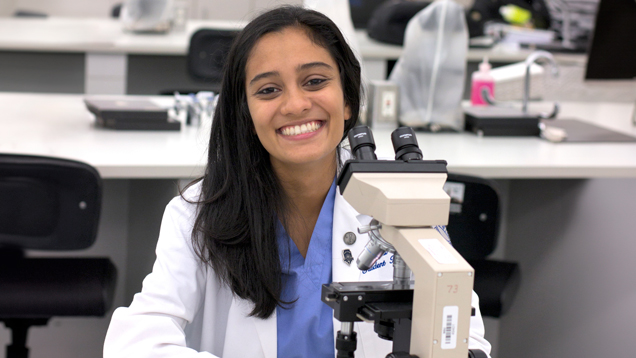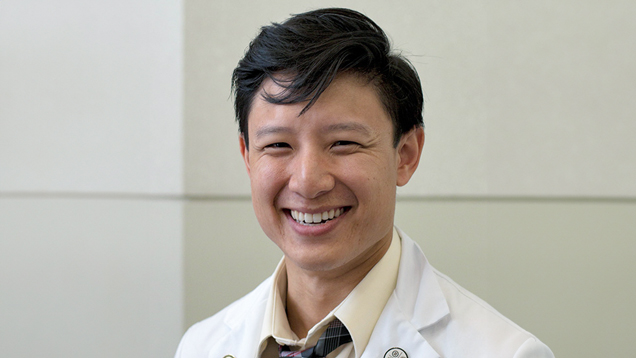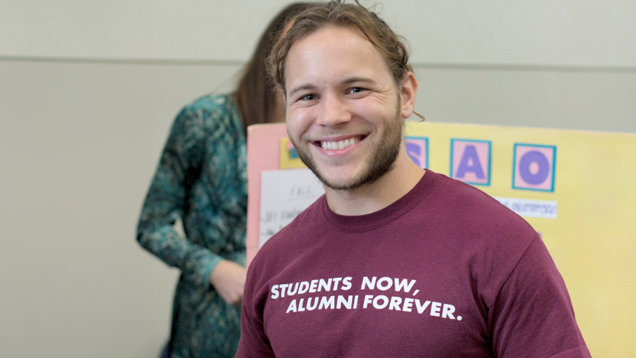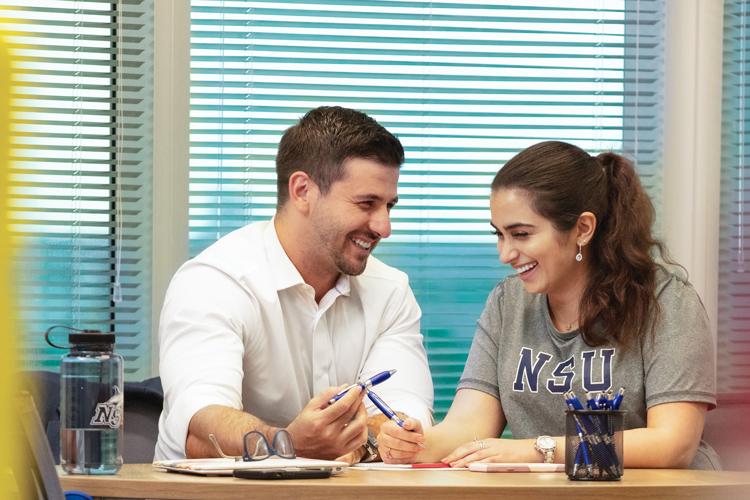Discover, plan, and reach your career goals with continuous advice and support during your time at the Nova Southeastern University’s College of Osteopathic Medicine.
Whether it’s a residency, promotion, or first job you’re seeking, you’ll have academic advisers who can help you plan, access to a professional network that can connect the dots, and peer mentors who can point you in the right direction. And it all starts on day one.
What Gives NSU Students an Edge?

Career Advising, Networking, Development & Opportunities
The CAN-DO program (Career Advising, Networking, Development & Opportunities) is designed for Doctor of Osteopathic (D.O.) students to discover and secure the residency or career outcome of choice.
Over the course of four years, you’ll work alongside peer mentors, faculty advisers, and career advisers to understand your interests, explore your options, make the decision, and choose your residency or career.
During your M1 year you will learn and understand yourself. You’re more likely to be satisfied in your professional life if your career matches your interests, values, personality, and skills. In medicine, these characteristics can be reflected in your preferred practice setting(s), patient type(s), medical condition(s), colleagues, and tasks and activities.
To find your fit, first explore who you are and what you want for your life, then identify those career options that will support those goals. Use the Careers in Medicine Self-Assessments to better understand yourself and support your specialty choice.
Use the Careers in Medicine tools to assess the assessments:
- Medical Specialty Preference Inventory
- Physician Skills Inventory
- Values (PVIPS)
- Focus and prioritize all of your M1 courses.
- Reach out to your Society faculty adviser and Medical Education if you're struggling with coursework.
- Attend Review/Study Tables to get help from tutors.
- Join specialty interest group(s) associated to explore different medical specialties.
- Keep a log of all relevant activities and pertinent roles you hold during your M1 year. This information will be used when preparing your CV in the M3 year for your ERAS.
- Meet with your career counseling adviser each semester.
During your M2 year you will explore your options. Everything you do and learn during medical school contributes to the total package you submit when applying for residency. However, it's not just the events that take place (e.g., a research project, a leave of absence), but how you handle them. No one expects you to be perfect — but residency programs do expect to see that you try hard, learn from your mistakes, are open to feedback, and strive to improve.
Maximize your experiences during medical school, learning and growing as much as possible. Use these strategies to strive for positive outcomes including personal and professional development as well as to successfully recover from and move past less than ideal situations. Continue to focus and priority all of your courses.
- For Academic Advising, reach out to your Society Faculty Adviser and/or Medical Education (954) 262-1716.
- Attend the Lottery Information Session to learn about the 3rd year clinical rotation process (View recording if you missed it, or need to review any of the questions).
- Integrate board prep materials with coursework. Contact Medical Education for resource materials (954) 262-1716.
- Explore the different specialties through Careers in Medicine (CiM), and participating group activities designed to help with specialty and career choices.
- Participate in specialty interest group(s) associated with preferred medical specialties.
- Seek out clinical and research opportunities by contacting Dr. Anna Potter: studentresearchdir@nova.edu
Earn a minimum score of 450 on COMSAE (pass COM 6990 course). - All Students in good academic standing are eligible to take the COMLEX Level 1.
- Attend mandatory Track Day in January.
Resources
Now that you are in the M3 year, you've completed the Careers in Medicine assessments, researched specialty options, and narrowed your choices. It's time to bring it all together and make your decision. With all the information at your disposal, you'll need to devise strategies to prioritize your values, interests, and skills.
Competitiveness can also influence specialty choice, and some say education debt and potential salary influence your decision. Here's how to consider these other influences in choosing your specialty.
- All students must have taken the COMLEX Level 1 at least one time by November 30 of their M3 year (please refer to the Student Handbook for additional information).
- Meet with M3 Career Adviser for specialty planning and decision after board scores.
- Begin clinical rotations.
- Develop relationship with Department Chairs for Department Chair Letters of Recommendation once you have chosen your specialty.
- Complete the Residency Preference Exercise (RPE) through Careers in Medicine site.
- Research desirable qualifications and competitiveness for specialties by using the CiM competitiveness tab under each specialty.
- Prepare a Curriculum Vitae (CV) and include relevant information from Year 1 through Year 3.
- Provide CV to Letter of Recommendation (LoR) writers.
- Complete the Specialty Indecision Scale (SIS) Assessment in CiM if you are having a difficult time narrowing down your specialty choice or unsure of your competitiveness. This will help you uncover the reasons that you are unable to make a decision.
- Schedule an appointment with your career counseling adviser if still having difficulty making a decision.
- Attend COM Residency Fair in August. Watch recording if you were unable to attend or have questions.
- Determine best timeframe to take the COMLEX Level 2 CE and select your test dates.
- Write your Personal Statement for MSPE. Include pivotal moments; influential and motivational patient experiences; aspects of specialties you enjoy or find inspiring; personal strengths you bring to a specialty.
- Think deeply about your specialty choices; research desirable qualifications and competitiveness.
- Meet with Career Counseling Adviser, society faculty adviser, or mentor to review your Personal Statement. Start Early!!
- Research residency positions and programs. Use the Careers in Medicine Prepare for Residency
- Attend presentation regarding applying for away rotations and begin scheduling for these rotations beginning August- December.
- During Clinical rotations
- Ask attending about his or her expectations of you and regularly ask for feedback (don’t wait for them to offer).
- Let program directors know you are interested in the program.
- Send a thank you after each rotation.
- Don’t be shy and reserved; be memorable in a good way.
- Find a trusted senior resident or physician to mentor you.
- Complete M3 Clinical Rotations
- Take COMLEX Level 2 CE. Most programs require that you take and pass before they interview or rank you. If you did not do well on the COMLEX Level 1, a good score on COMLEX Level 2 CE is even more important.
- Be aware of applicable early match deadlines or the Military Match
- Attend Come Home Day and Complete Activities.
- Register with ERAS once token emails are sent.
- Begin uploading documents
- Profile Picture
- CV
- Personal Statements
- Begin applying to residency programs. Know your deadlines.
Resources
- COMLEX Level 2 CE Description
- COMLEX Level 2 PE Description
You made it to your final year of Medical school. Choosing a residency is a big decision, and one that creates stress and anxiety for many students. Your residency is important because it’s a time of tremendous growth both in your clinical knowledge base as well as your professional development. Much of what you learn will come from patients. So you must find a program where you are motivated to learn and study about your patients and can become an excellent, caring, humanistic physician, as well as feel happy in your work and home environments.
There’s no one perfect residency that’s the best fit for all students — the best program for you depends on your strengths, weaknesses, goals, and personality. You must systematically approach researching and considering residencies to find programs that fit your individual needs and eventually match to a program and feel relatively happy during your time there.
- Pass COMLEX Level 2 CE and COMLEX Level 2 PE
- Register for Match
- The National Matching Service (NMS) in September 15th.
- The NRMP MATCH in September 15th.
- Standard Registration Deadline for Applicants is November 30th.
- Interview with residency programs (August – November of M4 year). This is a prime time to schedule “auditions” at top-choice programs. Send follow up correspondence to appropriate individuals.
- MSPE released on October 1st
- Rate programs using the official Rank Order List (ROL) ROL Tips for Success
- Ranking Submission begins: February 2, 2026; Rank Order List Certification Deadline: March 4, 2026
- Match Week Begins: March 16, 2026 - March 19, 2026
- Match Day: March 16, 2026
Secure placement in a graduate medical education program
Pathway to Match
While multiple residency matching programs utilize computer algorithms, you should choose which ones to participate in based on specialty and program applications. Success hinges on self-evaluation (competitiveness, specialty goals, and personal needs) and strategic decision-making to secure your residency position.
The American Osteopathic Association (AOA) offers valuable resources to help you navigate residency options:

Stand Out with Valuable Experience

Alumni: Where are They Now?
Share in the success of recent alumni like Gee Yoon Suzie Park, D.O. (’19), who was elected as president of the Emergency Medicine Residents Association of Michigan. Or Candace White-Jackson, D.O., M.P.H., M.S. (’12), who is the new CVS Health MinuteClinic medical director in the Atlanta Metro area.
Alumni of the College of Osteopathic Medicine are all across the world leading the
way to a healthier future. Many graduates go on to serve underserved populations and
do service work.
See What NSU Osteopathic Medicine Alumni Are Doing
Stay Engaged and Energized through the College of Osteopathic Medicine Alumni Network
You’ll always be a Shark. After graduating, the connections you’ve made both professionally and personally don’t go anywhere. In fact, you can expect a support system from the alumni network that provides a place to listen, learn, and share expertise within your field.
Through alumni mentorship programs to local events and communications, you’ll never feel as if you’re navigating the real world of osteopathic medicine alone.
Learn about the NSU Osteopathic Medicine Alumni Association



